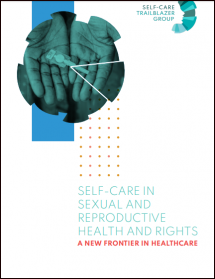Self-Care in Sexual and Reproductive Health and Rights: A New Frontier in Healthcare
The World Health Organization (WHO) defines self-care as the ability of individuals, families, and communities to promote and maintain health, prevent disease, and cope with illness with or without the support of a healthcare provider.
Questions of sex and reproduction are deeply personal topics that often are marred by social, cultural, and legal barriers to accessing support or services. When made accessible and affordable, self-care can improve autonomy, awareness, and decision-making around sexual and reproductive health and rights (SRHR). Advances in technologies and how they are integrated into health systems offer an opportunity to refocus attention on this important approach and increase choice and access to SRHR services.
The Self-Care Trailblazers Group (SCTG) serves as a platform to advocate for and help develop effective self-care practices at individual and health systems levels. The SCTG brings together stakeholders from an array of partner organizations to advance the conversation around three key objectives:
- Lead a communications and advocacy effort to support selfcare for SRHR at global, regional, national, and local levels
- Advance learnings and help build the evidence base around self-care
- Build a community of practice for developing, sharing, and applying concrete solutions for self-care
Source: Self-Care Trailblazer Group
Date of Publication: September 3, 2020
SIMILIAR RESOURCES
Tools
Examples
- Who Self-Cares Wins
- Self-Care: Better Daily Health for Individuals and Societies
- Self-Care: A Cost Effective Solution for Maternal, Newborn & Child Health for All
- WHO Consolidated Guideline on Self-care Interventions for Health: Sexual and Reproductive Health and Rights
- Advocacy Roadmap - Igniting a Self-Care Movement for Sexual and Reproductive Health
- Practical Guidance for Risk Communication and Community Engagement (RCCE) for Refugees, Internally Displaced Persons (IDPs), Migrants, and Host Communities Particularly Vulnerable to COVID-19 Pandemic
- Guidance for Including People with Disabilities in Response to the COVID-19 Pandemic
- A Guide to WHO’s Guidance on COVID-19
- Identifying & Mitigating Gender-based Violence Risks within the COVID-19 Response
- COVID-19: Resources to Address Gender-based Violence Risks

